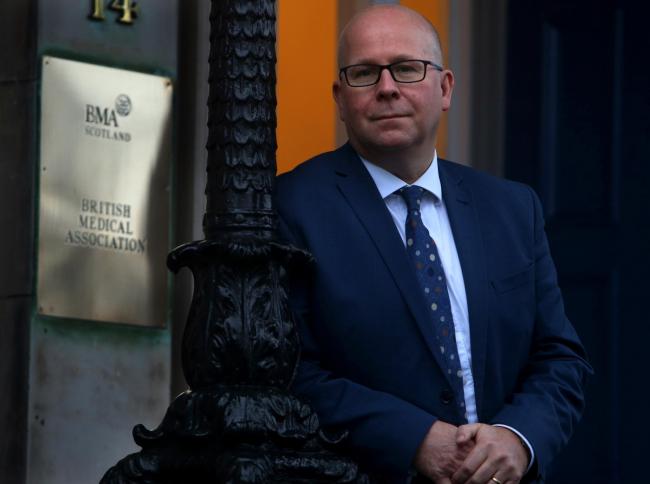Last week, GPs from all around Scotland gathered – virtually at least – for what was the first ever entirely digital Scottish LMC conference.
There was plenty to discuss – and looking back I was seriously impressed with the level of open, honest and respectful debate.
If you put that many GPs in a room (a digital one, on this occasion) there are bound to be many different perspectives. But we managed to discuss them with respect for one another and – I think – remembering that we are one profession all working for the same goal: genuine improvements for GPs so we can deliver truly excellent primary care across Scotland.
Amongst the many topics we addressed in motions and in questions to the BMA GP negotiating team, which I head up, the 2018 GMS contract was clearly one of the most prominent and pressing.
For those who maybe haven’t followed this too closely, or indeed lived and breathed it for the last two, nearly three years – you can find more details in the last blog I wrote.
Without covering too much old ground, the contract set an ambitious vision designed to ease inappropriate workload for GPs by expanding multi-disciplinary teams around them and allowing them to concentrate on the patients who need them most. In other words, allowing GPs more time to be expert medical generalists– and getting patients the right care for them, by the right person at the right time.
A three-year timetable for implementation was set back in 2018. For many reasons, it has been apparent for some time that while progress has been made, the contract was not going to be delivered in full in the original timescales.
This is absolutely not for want of trying. We – along with LMCs and GP sub-committees across the country have worked constantly on GPs behalf to push this forward and focus minds at Governmental and Health Board level.
There will be plenty of time soon enough to reflect on the reasons things haven’t been achieved – but as your negotiators in Scotland this left us with little option but to come up with the right solutions for the profession to handle what happens when deadlines were not met.
I want to say from the start that this doesn’t mean we weren’t very disappointed at where we found ourselves. As working GPs, the 3 negotiators absolutely share the frustration that many of you expressed loud and clear at the conference.
The absolute worst outcome it seemed to us was to allow some of these issues to drift, with no clear endpoints and GPs simply continuing to deliver services by default. Essentially, we had to deal with the position as we found it this autumn – there was just not enough progress, with areas likely not to be achieved. At that point, we felt our only real option was to work jointly with the Scottish Government to find solutions – not least as we absolutely believe that was the best way forward for GPs and reflects that the direction of travel remains the right one. Doing otherwise would have risked the progress already made or led to the kind of confrontation or inertia which would have delivered very little for GPs.
That is why we worked with the Government to agree a joint letter to the profession before last week’s conference. The letter means in effect that the Government must deliver on a firm timescale for the commitments to transfer services covered by the Memorandum of Understanding agreed in 2018. Unlike before, this letter commits the SG to transfer of responsibility for services from GPs to HSCPs and puts enhanced multi-disciplinary teams onto a contractual footing – effectively tying them permanently into this commitment – something we simply couldn’t persuade them to do when we first negotiated the contract in 2018.
And there are clear timescales for all elements. For example, all the vaccinations will transfer by 1st October – including travel vaccines. Remember when it was announced travel vacs would no longer be the responsibility of GPs at a previous LMC conference and GPs greeted the announcement with cheers? Well, we can now say these will contractually no longer be GPs responsibility in just 295 day’s time (and it may be less by the time you read this) due to the agreement we reached.
Of course, as the conference rightly demanded, there does need to be more detail, and we will bring that forward, keep members informed and consult with the BMA Scottish GP committee in the new year. We also need to reflect on why the transformation did not progress to plan and what more we can do to encourage health boards to prioritise forming the enhanced community multidisciplinary teams that are needed to take over the services.
The Scottish LMC conference has given us a powerful mandate to deliver the message to the Scottish Government that this transformation needs to be a whole system priority. Indeed, the Cabinet Secretary herself heard that loud and clear from the conference floor when she took questions and I will be pressing for how we can achieve that with her in the next few weeks.
Of course, Covid and its impact was another issue that came up strongly – and while the start of the Covid vaccination programme this week is great news we have to be realistic that Covid may go on impacting normal business for some time to come.
Finally, and on a separate subject – the impact of changes with reform of urgent care, accessing A&E and the NHS 111 system which began just last week came up as a worrying issue. We have since April highlighted our concern this could cause an unintended, inappropriate and un-resourced shift in workload to general practice. Worryingly we heard from LMCs last week that this may indeed already have been happening. We will absolutely raise these concerns to the highest level, if and when the evidence is clear. So, if you are aware of rapidly increasing workloads due to this change – please do let your LMC know, and your LMC will be able to alert SGPC. This is a significant and potentially destabilising issue for primary care, and we must – and will – monitor it extremely carefully.
Thanks again, for all you do and all those who inputted so strongly to the conference last week. We’ll be doing our best to keep you up to date on all the issues we are dealing with, through what remains of 2020 and into 2021, when we hope things may return to some sort of normality.
Dr Andrew Buist, chair of SGPC
If you’re not a member of the BMA and feel inspired to join and make our collective voice stronger, please click here. If you’re already a member and want more information on how to make the most of your membership, please click here.
Photo credited to Gordon Terris/Herald and Times Group

